-
 8 min. read
8 min. read
-
 Macy Storm
Macy Storm Senior Content Creator
Senior Content Creator
- Macy is a marketing writer with over five years of experience creating content for dozens of industries including food and beverage, home services, and education. She also specializes in creating SEO and PPC content. Her work has been featured by Search Engine Journal, HubSpot, Entrepreneur, Clutch, and more. In her free time, Macy enjoys trying new crafts and reading comic books.
Did you know that “coffee shops in Los Angeles” and “how do they make coffee” are two different types of search queries? Google breaks search queries into three categories:
- Navigational search queries
- Transactional search queries
- Informational search queries
As you’re getting started with your search engine optimization (SEO) campaign, it’s critical that you know these different types of search queries and learn how you can rank for them. In this post, we’ll cover the different types of searches and tell you how you can rank for them. Keep reading to learn more about types of searches on Google, and subscribe to Revenue Weekly to stay up to date on the latest SEO information!
1. Navigational types of search queries
What are navigational search queries?
The first type of search query we’ll look at is navigational search queries. This search query is known as the “Go” search query because when people conduct a navigational search query they’re looking for a specific website. For example, if someone wants to visit Target’s website, they type “Target” into a search engine instead of typing the URL into their browser.
 Navigational search queries have an apparent search intent. The user is looking for a specific business’s website by typing the brand name into the search bar. It’s known as the “Go” search query because people want to go to a specific website.
Navigational search queries have an apparent search intent. The user is looking for a specific business’s website by typing the brand name into the search bar. It’s known as the “Go” search query because people want to go to a specific website.
How should navigational search queries be targeted?
Navigational search queries are the only types of search queries you can’t target.
It’s difficult to optimize for these search queries unless you own the website the user wants. You can’t rank organically in your competition’s navigational search queries to try and drive traffic to your business over them.
How to optimize for navigational search queries
You may not be able to target navigational search queries specifically, but you can optimize for your navigational search query. Navigational queries are one of the types of searches on Google where your business should appear at the top of the search results.
Start by searching for your company on a search engine. If your business appears at the top of the search results, you’re good to go! 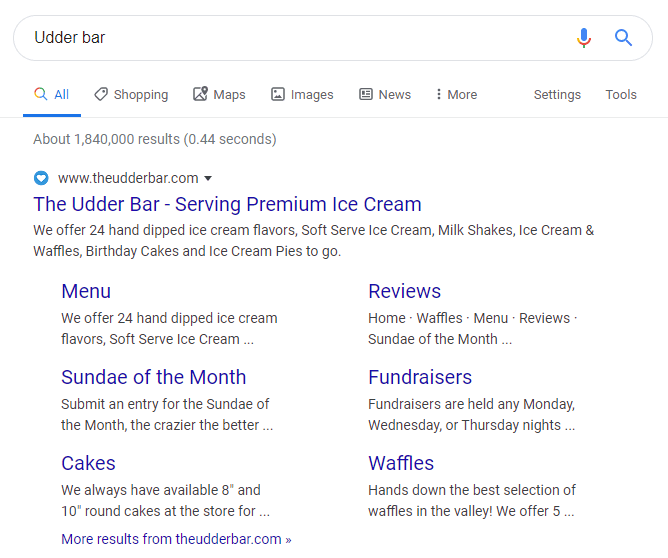 In cases where you’re not at the top, you may need to optimize your site to ensure Google finds relevant information about your business.
In cases where you’re not at the top, you may need to optimize your site to ensure Google finds relevant information about your business.
Make sure your website contains information like your:
- Brand name
- Services
- Products
- Location
This business-specific information should help optimize your site so you appear higher for your navigational search queries. Additionally, you can run a sponsored ad, known as pay-per-click (PPC) ads, for your navigational search queries. PPC ads help ensure that you appear at the top of your brand’s navigational search query results.
You can follow in JC Penny’s footsteps by having both a sponsored and organic listing in your navigational search queries. 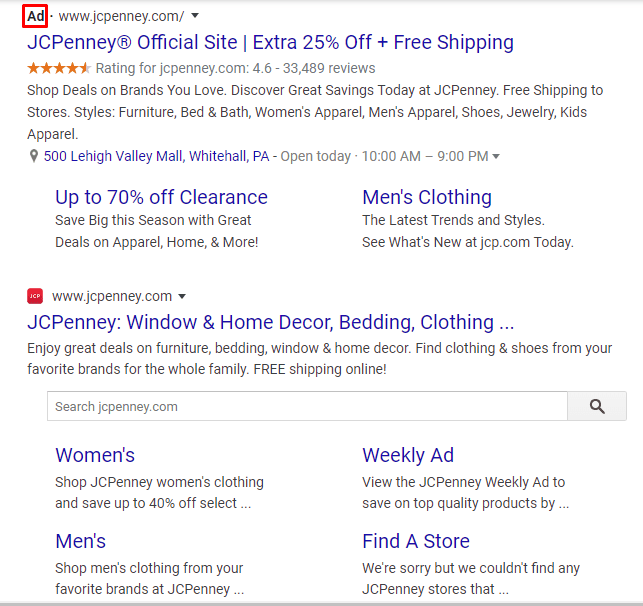 JC Penny has a sponsored ad and their organic listing in their navigational search, ensuring that searchers will always find their website.
JC Penny has a sponsored ad and their organic listing in their navigational search, ensuring that searchers will always find their website.
2. Transactional types of search queries
What are transactional search queries?
Transactional search queries are a type of search query that users conduct when looking to complete a transaction, such as a purchase. Some of these search queries include phrases like “buy,” “purchase,” and “order.” It’s known as the “Do” search query because searchers are looking to do something, like buy a product. A transactional search query can encompass a few different types of searches, including:
- Brand-focused searches: Transactional search queries can be for products with specific brand names, like “Keurig coffee maker” or “Mr. Coffee coffee maker.”
- Generic searches: Someone can search for a product like “iced coffee maker” and still have transactional intent, even though the search isn’t specific to a brand or product model.
- Vertical searches: These searches focus on transactions to a specific industry, like restaurants or hotels. “Los Angeles coffee shop” is an example of a vertical search with transactional intent.
People who conduct transactional searches tend to be closer to conversion than other searchers. Many of them will purchase something as soon as they perform the query, so these types of searches on Google are extremely valuable.
How should transactional search queries be targeted?
Yes! If you have a product or offer a service that’s relevant to a transactional search query, you can target these queries to reach people interested in your products or services.
How to optimize for transactional search queries
To help you appear in transactional search queries, you’ll need to optimize your product listings or service pages.
You can optimize your listings by:
- Ensuring you’re using relevant product/service keywords in your title tag, content, image alt tags, and more
- Adding relevant and helpful information that drive more leads to your listing, like highlighting the product’s color, size, or material or the service’s features and price
- Putting appropriate calls to action (CTAs) on your page to boost conversions and help you rank better
The best way to rank for transactional types of Google searches is to create a thorough and informative product and service listings. When you have better listings, your audience can make more informed purchasing decisions, which makes them more likely to become a customer.
Bonus idea: Invest in PPC ads to secure more transactions.
When companies try to rank in transactional searches, many take a two-tier approach to these search queries. If you want to step up your game in transactional searches, invest in PPC ads for these queries.
PPC ads work well with transactional queries because of the high purchase intent. When someone visits your business through a PPC ad, they’re 50% more likely to purchase than an organic visitor. These ads appear at the top of transactional searches, making people more inclined to click them and buy your product if it fits their needs.
You can create PPC ads for specific services or products and develop landing pages that focus solely on that offer. Take Keurig as an example. When you search for “iced coffee maker,” you find their ad at the top of the search results.
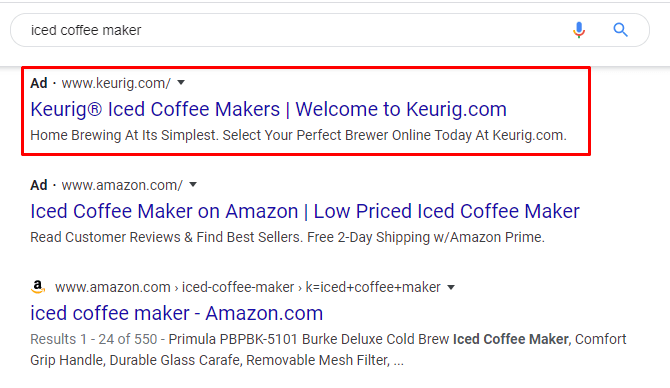 As you scroll down the page, you find that their organic ranking doesn’t even make it to the first page of the search results! Instead, listings for iced coffee makers at Target, Amazon, Bed Bath and Beyond, and Walmart beat Keurig.
As you scroll down the page, you find that their organic ranking doesn’t even make it to the first page of the search results! Instead, listings for iced coffee makers at Target, Amazon, Bed Bath and Beyond, and Walmart beat Keurig. 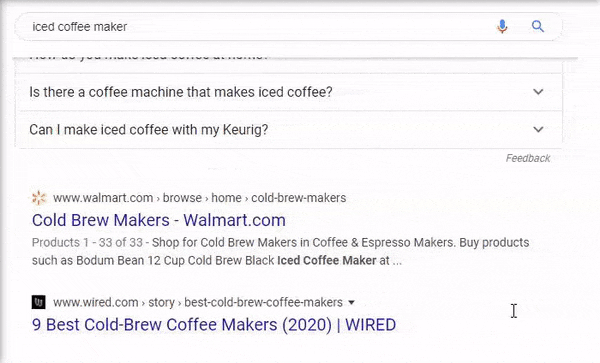 As you can see, Keurig’s ad plays a significant role in helping them drive traffic to their page for their iced coffee makers.
As you can see, Keurig’s ad plays a significant role in helping them drive traffic to their page for their iced coffee makers.
Without the ad, they wouldn’t drive traffic from a transactional search query that is extremely relevant and important to their company!
3. Informational types of search queries
What are informational search queries?
Informational search queries are queries that cover broad topics. When someone conducts an informational search query, they’re looking for answers to a question. This search query type is known as the “Know” search query because people are looking for helpful information.
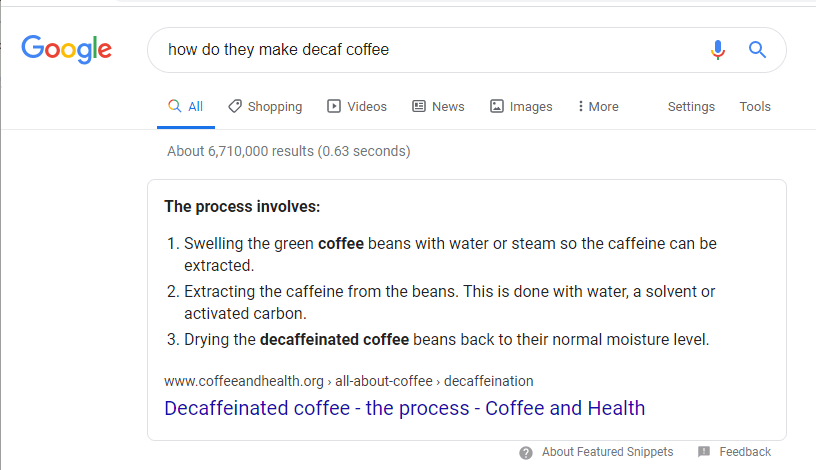
How should informational search queries be targeted?
Yes! Most searches on search engines like Google and Bing are informational search queries. This search frequency makes it crucial that you optimize for these searches.
Any company can target informational search queries, and you must do it, since your competitors are already doing it!
How to optimize for informational search queries
If you want to appear in informational search queries, the best way to do it is to create high-quality content. If you’re going to target these search queries and rank in them, you need to provide users with the information they seek. You can create high-quality content like:
- Blog posts
- Videos
- Guides
- Ebooks
- Infographics
All these content formats work when you’re trying to rank for informational search queries. The format you choose will depend on the topic and the kind of content your audience likes. If you want to rank in informational search queries, you can optimize by:
- Focusing on industry-related topics to drive the right traffic to your page
- Integrating long-tail keywords (keywords with three or more words) to help your content appear in relevant, but less competitive search queries
- Providing quality information and details about a topic to help your audience feel informed
- Refraining from aggressively plugging your products or services (unless the search intent shows otherwise)
When you create content, you position yourself as an authority in your field. People will see your business as a trustworthy and reliable source of information. You’ll build brand awareness and trust with your audience.
Optimize for different types of searches on Google today
If you want to start driving more valuable traffic to your business, start optimizing for different types of search queries.
From transactional to informational searches, you have numerous opportunities to reach interested leads and drive them to your business. Do you need help getting started with optimizing for different types of search queries? Contact us online or call us today at 888-601-5359 to speak with a strategist about our SEO plans.
-
 Macy is a marketing writer with over five years of experience creating content for dozens of industries including food and beverage, home services, and education. She also specializes in creating SEO and PPC content. Her work has been featured by Search Engine Journal, HubSpot, Entrepreneur, Clutch, and more. In her free time, Macy enjoys trying new crafts and reading comic books.
Macy is a marketing writer with over five years of experience creating content for dozens of industries including food and beverage, home services, and education. She also specializes in creating SEO and PPC content. Her work has been featured by Search Engine Journal, HubSpot, Entrepreneur, Clutch, and more. In her free time, Macy enjoys trying new crafts and reading comic books. -

WebFX is a full-service marketing agency with 1,100+ client reviews and a 4.9-star rating on Clutch! Find out how our expert team and revenue-accelerating tech can drive results for you! Learn more
Try our free SEO Checker
Boost your site’s search performance with our free SEO Checker. Analyze your website for optimization tips on titles, headers, content, speed, and more. Get a free report now to enhance rankings on Google, Bing, Yahoo, and beyond!
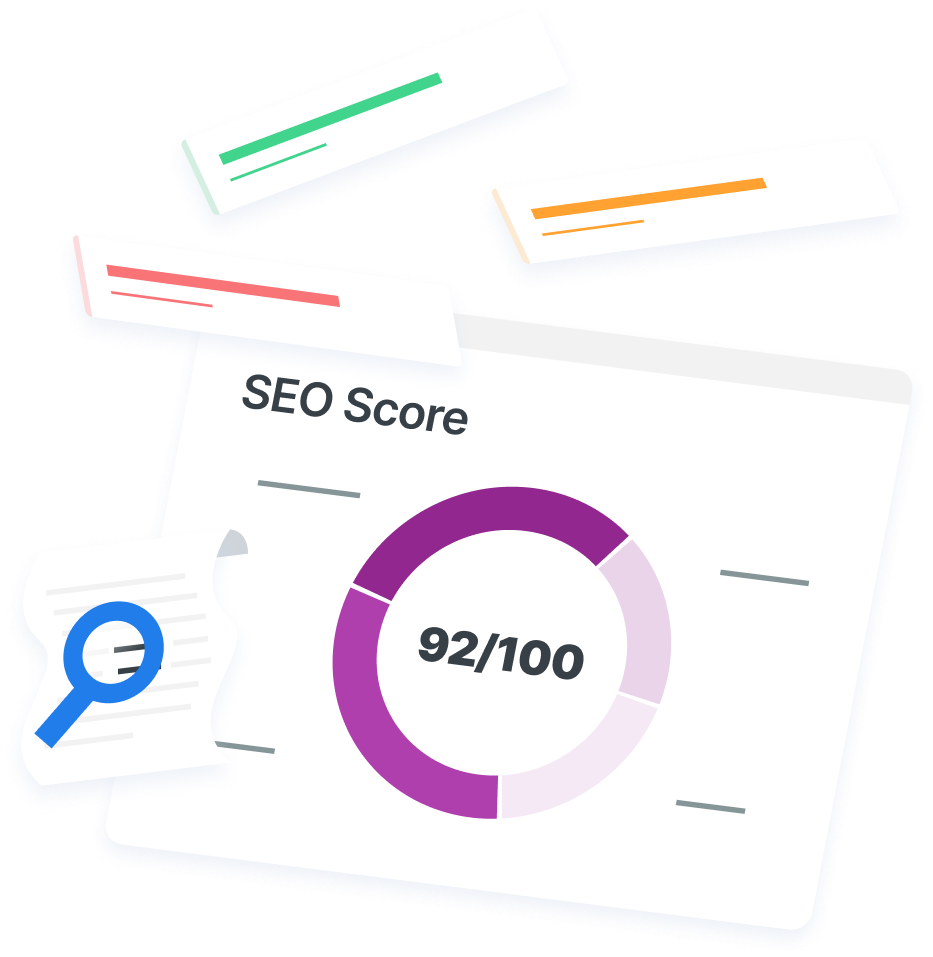
Table of Contents
- 1. Navigational Types of Search Queries
- What Are Navigational Search Queries?
- How Should Navigational Search Queries Be Targeted?
- How to Optimize for Navigational Search Queries
- 2. Transactional Types of Search Queries
- What Are Transactional Search Queries?
- How Should Transactional Search Queries Be Targeted?
- How to Optimize for Transactional Search Queries
- 3. Informational Types of Search Queries
- What Are Informational Search Queries?
- How Should Informational Search Queries Be Targeted?
- How to Optimize for Informational Search Queries
- Optimize for Different Types of Searches on Google Today

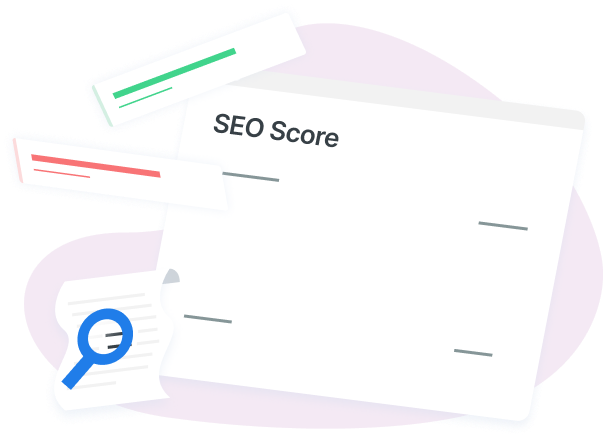
How Is Your Website’s SEO?
Use our free tool to get your score calculated in under 60 seconds.
Try our free SEO Checker
Boost your site’s search performance with our free SEO Checker. Analyze your website for optimization tips on titles, headers, content, speed, and more. Get a free report now to enhance rankings on Google, Bing, Yahoo, and beyond!






